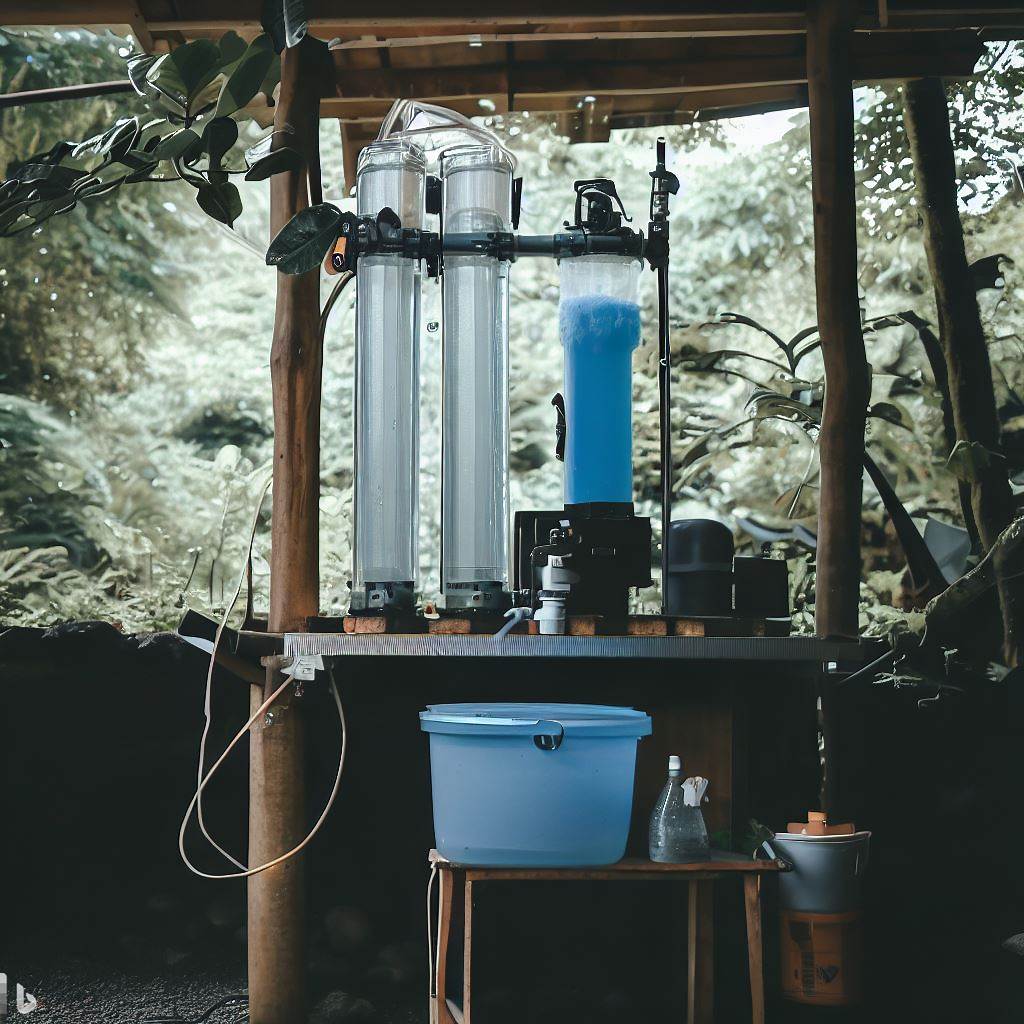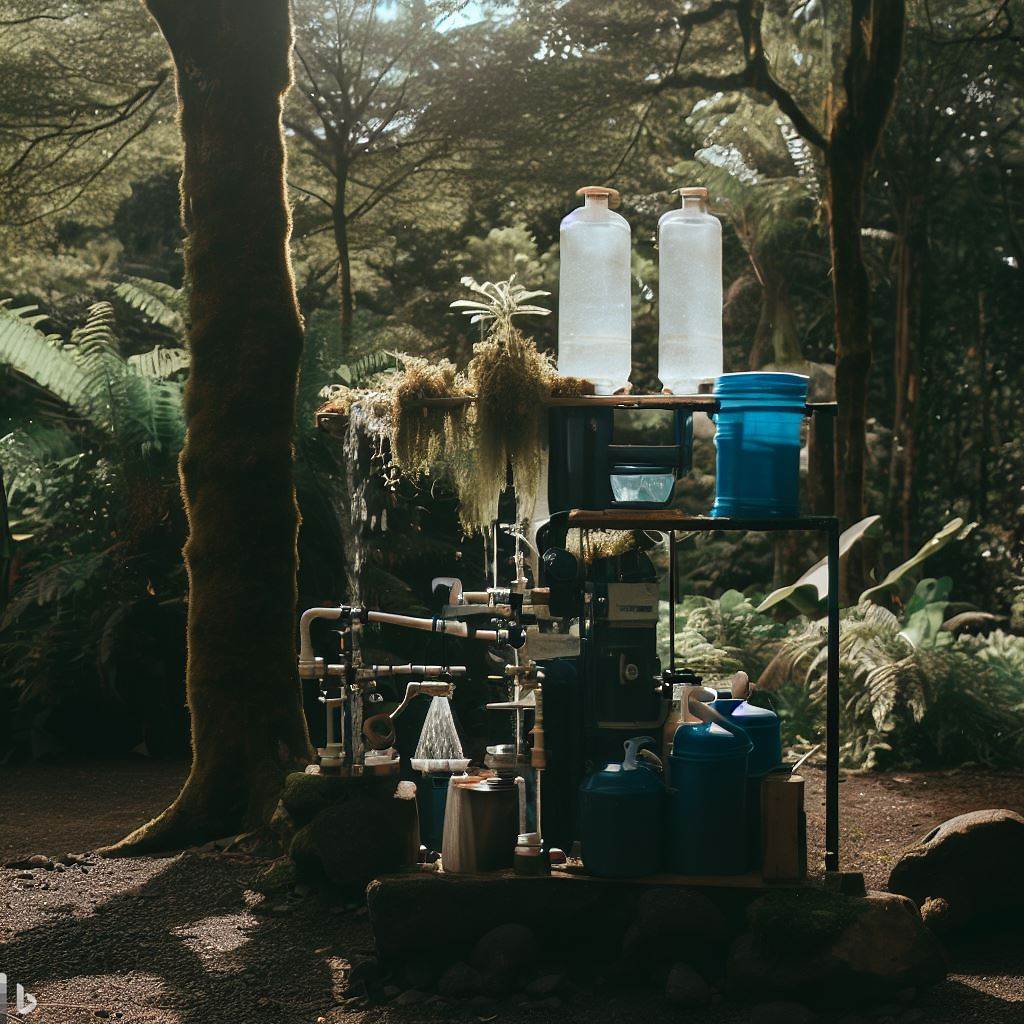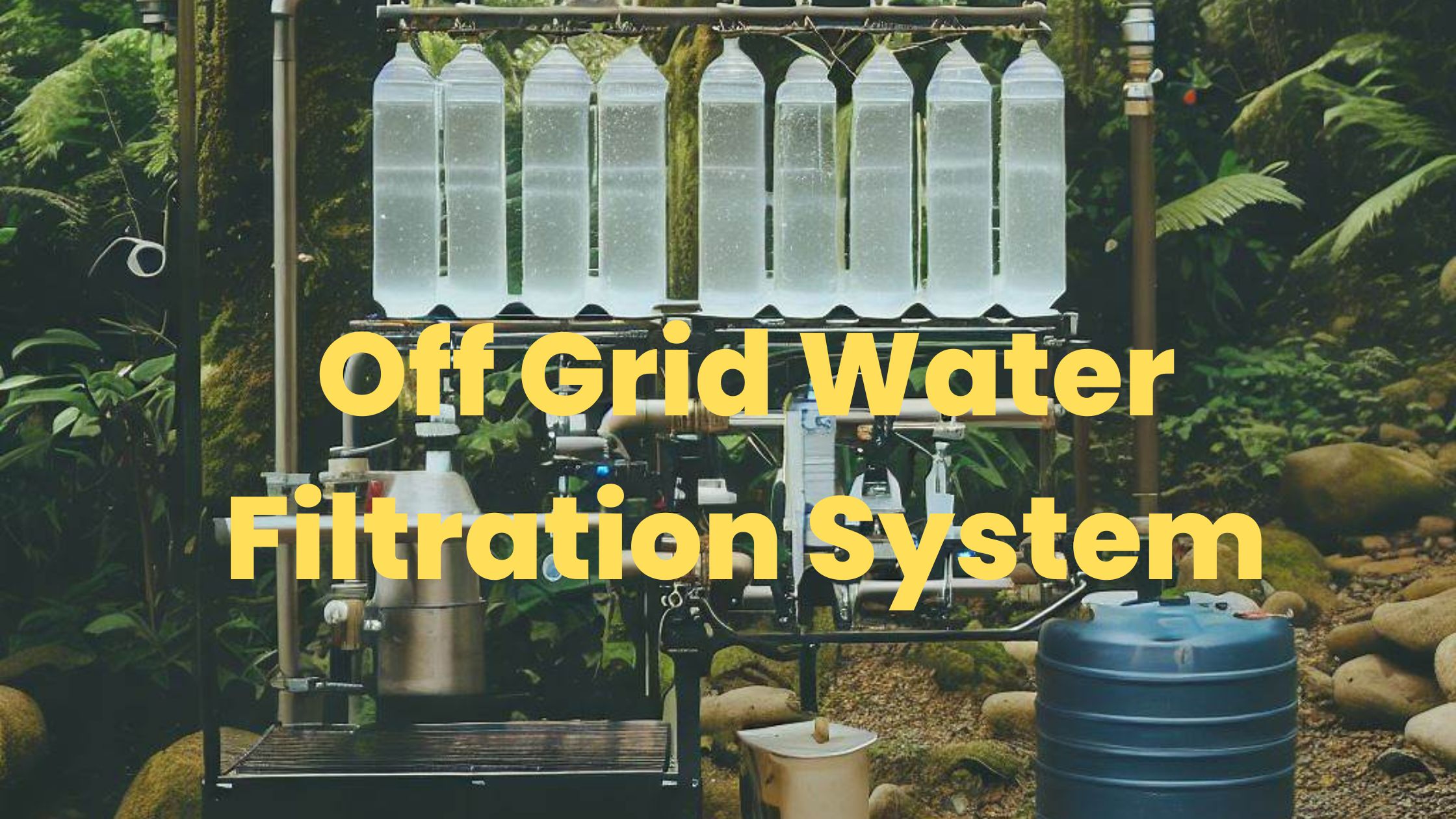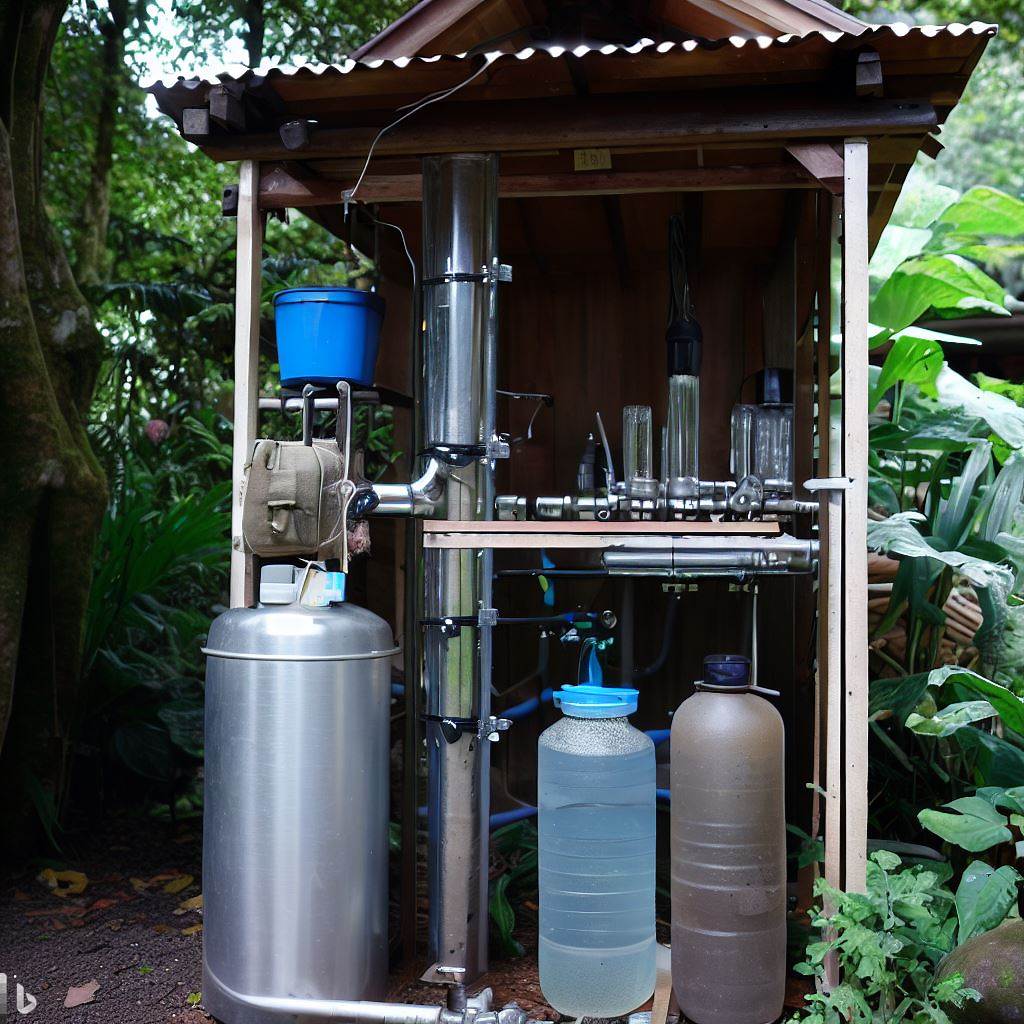In remote locations with limited access to clean water, having a reliable off grid water filter is essential. Whether camping, hiking, or living off the grid, having access to clean, pure and safe drinking water is crucial for your health and well-being. This article will explore the importance of off-grid water filters, their benefits, and how they work. We will discuss the common questions and concerns regarding off grid water filters to help you make an informed decision.
Off Grid Water Filter: A Lifesaver in Remote Areas
Living off the grid or exploring remote areas often means being far away from conventional water sources. It is essential to have a reliable and efficient off-grid water filter to ensure access to clean and safe drinking water. An off-grid water filter removes impurities, contaminants, and potentially harmful microorganisms from untreated water sources such as rivers, lakes, and streams.

The Benefits of Using an Off Grid Water Filter
An off-grid water filter offers numerous benefits, making it a valuable investment for anyone venturing into remote locations. Some key benefits include:
1. Access to Clean Water Anywhere
An off-grid water filter allows you to access clean and safe drinking water regardless of location. These filters are designed to purify water from natural sources, eliminating the need to carry large quantities of bottled water or rely on uncertain water supplies.
2. Portability and Convenience
Off-grid water filters are lightweight, compact, and portable, making them ideal for outdoor enthusiasts and those living off the grid. These filters can easily fit into backpacks, survival kits, or emergency supplies, ensuring you can access clean water whenever and wherever you need it.
3. Cost-Effective Solution
Investing in an off-grid water filter can save you money in the long run. Instead of continuously purchasing bottled water or relying on expensive purification systems, you can filter water from natural sources without spending additional money. It is a cost-effective solution that reduces waste and promotes sustainability.
4. Independence from Municipal Water Systems
An off-grid water filter provides independence from municipal water systems for individuals living off the grid or in remote areas. You can rely on natural water sources, ensuring a constant supply of clean water without needing electricity or plumbing infrastructure.
5. Emergency Preparedness
Having an off-grid water filter is an essential part of emergency preparedness. When the regular water supply is compromised in a natural disaster or other emergency issuees, you can rely on your off-grid filter to provide clean water for drinking, cooking, and hygiene purposes.
How Off Grid Water Filters Work?
Off-grid water filters utilize various filtration technologies to remove impurities and contaminants from untreated water. The filtration process typically involves multiple stages designed to target specific pollutants. Here’s a breakdown of the standard filtration technologies used in off-grid water filters:
1. Pre-Filtration
The first stage of the filtration process is pre-filtration. It involves removing larger particles such as sediment, dirt, and debris. Pre-filtration helps prolong the lifespan of the primary filter and improves its overall efficiency.
2. Activated Carbon Filtration
Activated carbon filtration is commonly used in off-grid water filters to remove chlorine, odours, and organic compounds. Activated carbon has a porous structure that adsorbs impurities and improves the smelland smell of the filtered water.
3. Microfiltration or Ultrafiltration
Microfiltration or ultrafiltration membranes remove bacteria, protozoa, and other microorganisms from the water. These membranes have tiny pores that effectively block contaminants, ensuring the water is safe to drink.
4. Reverse Osmosis (RO) Filtration
Some advanced off-grid water filters utilize reverse osmosis technology to purify the water further. Reverse osmosis filters employ a semipermeable membrane that removes dissolved solids, heavy metals, and other contaminants. This stage ensures the highest level of water purity.
5. Sterilization
Sometimes, off-grid water filters incorporate additional sterilization methods such as UV light or chemical disinfection to eliminate any remaining microorganisms and ensure the water is safe for consumption.
What is off grid water purification?
Off-grid water purification refers to treating water from natural sources to make it safe and suitable for consumption without relying on conventional infrastructure such as electricity or municipal water systems. This is particularly useful in remote locations or during emergencies when access to clean water may be limited or unavailable.
Several methods of off-grid water purification can be employed:
- 1.Boiling: Boiling the water is the oldest and simplest purification method. By bringing water to a rolling boil for at least one minute (or three minutes at higher altitudes), most microorganisms and pathogens are killed, making the water safe to drink. However, boiling does not remove chemical contaminants or sediment.
- 2. Filtration: Various filtration methods can remove impurities from water. Portable water filters or filtration systems with activated carbon, ceramic, or other filter media can effectively remove bacteria, protozoa, and sediment from water. However, they may not eliminate viruses or specific chemical contaminants.
- 3. Chemical disinfection: Chemicals such as chlorine or iodine can disinfect water. These substances kill or inactivate many types of microorganisms. However, chemical disinfection may not be effective against all kinds of pathogens and may leave an unpleasant taste in the water. Following the instructions and recommended dosage when using chemical disinfectants is essential.
- 4. Solar disinfection (SODIS): SODIS is a method that uses solar energy to purify water. It involves placing clear plastic bottles filled with water in direct sunlight for at least six hours (preferably in a sunny climate). The combined effect of heat and UV radiation kills most microorganisms. SODIS is a simple and low-cost method but may not be suitable in areas with limited sunlight or during cloudy days.
- 5. Distillation: Distillation involves heating water to produce steam, which is then collected and condensed to produce purified water. This method effectively removes contaminants such as bacteria, viruses, heavy metals, and chemicals. However, distillation can be energy-intensive and impractical in off-grid situations unless alternative heat sources are available.
It’s important to note that no single method is perfect, and the choice of water purification method depends on the specific circumstances and available resources. Combining techniques or employing multiple treatment layers is often advisable to ensure thorough purification. Additionally, the treated water’s regular maintenance and periodic testing are crucial to ensure its ongoing safety and quality.
What is a gravity-fed water filter?
A gravity-fed water filter is a type of water filtration system that operates without electricity or water pressure. It uses the force of gravity to move water through the filtration process. This makes it suitable for off-grid or low-resource settings where access to electricity or pressurized water may be limited.
The basic components of a gravity-fed water filter typically include the following:
- Filter unit: This is the system’s main part where water purification occurs. It consists of one or more filter elements that remove impurities and contaminants from the water. Standard filter media used in gravity-fed filters include activated carbon, ceramic, or various materials.
- Water container: The water container is a reservoir holding untreated water. It is typically positioned at an elevated level above the filter unit to create gravitational pressure. The container can be a simple bucket, barrel, or any other suitable vessel holding sufficient water.
- Outlet or tap: The filtered water is collected and dispensed through an outlet or tap attached to the filter unit. This allows easy access to the purified water for drinking or other uses.
The functioning of a gravity-fed water filter is straightforward. When the untreated water is poured into the top container, gravity causes it to flow downward through the filter unit. As the water passes through the filter media, impurities, sediments, bacteria, and other contaminants are captured, leaving clean, purified water behind. The pure water collects in the lower section of the filter unit and can be accessed through the outlet or tap.
Gravity-fed water filters are known for their simplicity, reliability, and low maintenance requirements. They effectively remove various contaminants, including sediment, bacteria, protozoa, viruses, and certain chemicals. However, it’s important to note that not all gravity-fed filters are designed to remove all types of contaminants, so choosing a filter that suits your specific water quality needs is crucial.
Regular maintenance, such as cleaning or replacing filter elements, is necessary to ensure optimal performance. Additionally, periodic testing of filtered water is recommended to ensure its safety and quality.
Overall, gravity-fed water filters provide a convenient and efficient way to obtain clean drinking water in off-grid or low-resource situations without electricity or water pressure.
What are the 4 types of filters?
Several types of water filters are available, and they can be categorized into 4 main types based on the filtration mechanisms they employ. These four types of water filters are:
1. Activated Carbon Filters: Activated carbon filters are one of the most common types of water filters. They use a porous carbon material treated to have a large surface area. The activated carbon attracts and adsorbs contaminants such as chlorine, volatile organic compounds (VOCs), some heavy metals, and certain chemicals. These filters are effective at improving the taste and odour of water. However, they may not effectively remove minerals, salts, or microorganisms.
2. Reverse Osmosis (RO) Filters: Reverse osmosis filters use a semipermeable membrane to remove of pollutants. Water is forced through the membrane, with microscopic pores blocking impurities such as bacteria, viruses, dissolved solids, heavy metals, and chemicals. RO filters can produce highly purified water, but they can be slower and waste some water during the filtration process. They often require electricity to operate the pump, which creates the necessary pressure.
3. Ceramic Filters: Ceramic filters are made from porous ceramic materials that trap sediment, bacteria, and protozoa. They have tiny pores that physically block these contaminants while allowing water to pass through. Ceramic filters are often used in gravity-fed systems or portable water filters. They are affordable, easy to maintain, and do not require electricity. However, they may not remove chemical contaminants or viruses.
4. Ultraviolet (UV) Filters: UV filters use ultraviolet light to kill or inactivate microorganisms like bacteria, viruses, and protozoa. Water is exposed to UV light as it flows through the filter, disrupting the DNA of the microorganisms and rendering them unable to reproduce. UV filters are highly effective in disinfecting water and do not require chemicals. However, they do not remove sediment, heavy metals, or chemical contaminants.
It’s important to note that these four types of filters can be combined in multiple ways to create multi-stage filtration systems that offer comprehensive water purification. Each type of filter has its strengths and limitations, so the filter choice depends on the specific contaminants present in the water and the desired level of purification. Regular maintenance, such as replacing filter cartridges or cleaning the filter media, ensures the filters’ effectiveness.
10 Best Off Grid Water Filters on Amazon
Here’s a brief description of each of the listed off-grid water filters:

Best Off Grid Water Filters on Amazon
1. Sawyer Products Mini Water Filtration System: The Sawyer Mini is a compact and lightweight water filtration system that is highly portable, making it ideal for off-grid adventures. It uses a hollow fibre membrane filter to remove bacteria, protozoa, and sediment from water, providing up to 100,000 gallons of clean water. The filter can be attached to standard water bottles or used with a collapsible pouch for easy filling and drinking.
2. LifeStraw Personal Water Filter: LifeStraw is a famous and trusted brand known for its simplicity and effectiveness. The LifeStraw Personal Water Filter is a lightweight, portable straw-like filter that allows you to drink directly from contaminated water sources. It utilizes a microfiltration membrane to remove bacteria, parasites, and microplastics, providing clean drinking water. The filter can purify up to 4,000 litres of water, making it a reliable companion for hiking, camping, and emergencies.
3. Berkey Travel Gravity-Fed Water Filter System: The Berkey Travel Water Filter is a gravity-fed system that provides efficient purification without needing electricity or water pressure. It is a stainless steel construction and uses replaceable Black Berkey filter elements. The system can remove many contaminants, including bacteria, viruses, heavy metals, and chemicals. It has a large water capacity and is suitable for small groups or families during off-grid situations.
4. Katadyn Pocket Water Filter: The Katadyn Pocket Water Filter is a robust and reliable option for off-grid water purification. It uses a ceramic filter element with a silver-impregnated core to remove bacteria, protozoa, and other microorganisms from water. The durable construction and long filter life make it suitable for frequent use in rugged environments. The filter can treat up to 13,000 gallons of water, providing a dependable source of clean drinking water.
5. MSR Guardian Purifier Pump: The MSR Guardian Purifier is a high-performance water purifier designed for extreme conditions. It utilizes advanced hollow fibre technology and a self-cleaning mechanism to remove bacteria, viruses, protozoa, and particulate matter from water. The cleaner is built to withstand challenging environments and can handle turbid water sources. It provides fast and reliable water purification, making it a favourite among outdoor enthusiasts and adventurers.
6. Platypus GravityWorks Water Filter System: The Platypus GravityWorks Water Filter System is a convenient and efficient gravity-fed filtration system. It features a dual-bag design, with one bag for dirty water and another for filtered water. By simply filling the dirty water bag and suspending it higher than the clean water bag, gravity allows water to pass through the inline filter, removing bacteria, protozoa, and particulates. This system is lightweight, easy to use, and provides fast filtration for groups or individuals in off-grid settings.
7. Aquasana Clean Water Machine: The Aquasana Clean Water Machine is a countertop water filter system that provides on-demand filtered water for drinking and cooking. It utilizes a combination of activated carbon, ion exchange, and sub-micron filtration technologies to remove contaminants such as chlorine, lead, mercury, and pharmaceuticals. The system has a high flow rate and a long-lasting filter that can purify up to 320 gallons of water. With its sleek design and ease of use, it’s a convenient option for off-grid living or as a portable filter for RVs and boats.
8. HydroBlu Versa Flow Water Filter System: The HydroBlu Versa Flow Water Filter System is a versatile and lightweight water filter. It features a hollow fibre membrane that removes bacteria, protozoa, and particulates from water sources. The filter can be used in multiple ways, such as inline with a hydration bladder, attached to a water bottle, or used as a straw for direct drinking. Its compact size make it suitable for backpacking, camping, and emergency preparedness.
9. Survivor Filter PRO Water Filter: The Survivor Filter is a compact, portable filter designed for off-grid situations. It uses a three-stage filtration process, including a pre-filter, carbon filter, and hollow fibre membrane. This combination effectively removes bacteria, viruses, heavy metals, and other contaminants from water. The filter can be used with the included squeeze bag, attached to standard water bottles, or with a hydration bladder. It’s durable construction and long-lasting filter make it a reliable choice for outdoor enthusiasts and emergency kits.
10. LifeSaver Liberty Water Purifier Bottle: The LifeSaver Liberty Water Purifier Bottle is an all-in-one solution for portable water purification. It combines a high-performance filter with a convenient water bottle design. The filter features an ultrafiltration membrane that removes bacteria, viruses, cysts, and particulates from water, providing clean drinking water on the go. The bottle also includes a replaceable activated carbon disc for additional taste and odour improvement. With its versatile design and easy operation, the LifeSaver Liberty is a popular choice for outdoor adventures and travel.
Please note that these descriptions are meant to provide a general overview of each product, and it’s essential to conduct thorough research and read customer reviews to ensure that a particular water filter meets your specific needs and requirements.
FAQs about Off Grid Water Filters
Q1. How often should I replace the filters in my off-grid water filter?
Ans. The frequency of filter replacement mostly depends on the specific off-grid water filter you are using and the filtered water quality. Generally, replacing the filters every 6 to 12 months or according to the manufacturer’s instructions is recommended. Regular maintenance and filter replacements ensure optimal performance and water quality.
Q2. Can off-grid water filters remove viruses?
Ans. Most off-grid water filters, including microfiltration and ultrafiltration systems, can effectively remove bacteria and protozoa. However, these filters may not be able to remove viruses, as viruses are significantly smaller in size. If you are concerned about viruses in the water, it is advisable to choose an off-grid water filter with a reverse osmosis stage or a separate virus removal system.
Q3. Can I use my off-grid water filter in freezing temperatures?
Ans. The performance of off-grid water filters can be affected by extreme cold temperatures. Freezing temperatures can cause damage to the filter components and reduce their effectiveness. It is necessary to follow the manufacturer’s guidelines regarding temperature limitations and take appropriate measures to protect the filter from freezing, such as keeping it insulated or storing it in a warm location.
Q4. Can I filter saltwater with an off-grid water filter?
Ans. Most off-grid water filters are not designed to filter saltwater. The high salt content in seawater requires specialized desalination systems that utilize reverse osmosis or distillation processes. If you need to filter saltwater, consider investing in a dedicated desalination system designed explicitly for that purpose.
Q5. How do I clean and maintain my off-grid water filter?
Ans. Regular cleaning and maintenance are crucial for your off-grid water filter’s longevity and optimal performance. Follow the manufacturer’s instructions for cleaning and sanitizing the filter components. Rinse the filter after each use and store it properly to prevent bacteria or mould growth. Relying on the filters as recommended is important to ensure consistent water quality.
Q6. Are off-grid water filters suitable for long-term use?
Ans. Off-grid water filters are designed to provide reliable and continuous access to clean water, making them suitable for long-term use. However, it is important to regularly monitor the filter’s performance, replace filters as needed, and follow proper maintenance procedures. It is also recommended to have backup filtration options or spare parts in case of emergencies or unexpected failures.
Conclusion :
Investing in a high-quality off-grid water filter is wise for anyone who enjoys outdoor activities or lives in remote locations. These filters provide a reliable and convenient solution for accessing clean and safe drinking water, ensuring your health and well-being. By understanding how off-grid water filters work and addressing common concerns through the FAQs provided, you can choose the right off-grid water filter for your needs.
Related Articles:
What is the Most efficient Off Grid Lighting System?
What is Maple Syrup Evaporator?
How to Install an Off Grid Outdoor Shower?


